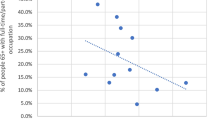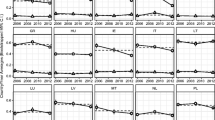Abstract
This paper explains individual start-up activities on the basis of both person-related characteristics and the regional context. The analysis is based upon micro data from the GEM adult population survey. Both individual and regional variables have an influence on the decision to become self-employed. There are considerable differences between nascent opportunity entrepreneurship and nascent necessity entrepreneurship. Whereas the results for opportunity entrepreneurship are in line with theoretical predictions the factors influencing necessity entrepreneurship are far more difficult to determine. The most significant change between 2001 and 2003/2004 is the reversal of the influence of a change in the regional rate of unemployment on nascent entrepreneurship activities.
Similar content being viewed by others
References
Armington C., and Acs Z. J., 2002, ‚The Determinants of Regional Variation in New Firm Formation’, Regional Studies 36, 33–45
Audretsch D. B., and Fritsch M., 1994, ‚The Geography of Firm Births in Germany’, Regional Studies 28, 359–365
Bartik T. J., 1989, ‚Small Business Start-Ups in the United States: Estimates of the Effects of Characteristics of States’, Southern Economic Journal 55, 1004–1018
Bates T., 1995, ‚Self-Employment Entry across Industry Groups’, Journal of Business Venturing 10, 143–156
Bergmann H., 2004, Gruendungsaktivitaeten im regionalen Kontext, Gruender, Gruendungseinstellungen und Rahmenbedingungen in zehn deutschen Regionen [Start-up Activities in a Regional Context, Founders, Entrepreneurial Attitudes and Framework Conditions in ten German Regions], Koelner Forschungen zur Wirtschafts- und Sozialgeographie, 57, Cologne: Institute of Economic and Social Geography
Brixy U., and Grotz R., 2002, Raeumliche Differenzierungen von Betriebsgruendungen und Ueberlebenschancen in Westdeutschland 1983 bis 1997 [Spatial Differenciation of Start-ups and Survival Chances in West-Germany 1983 to 1997], Raumforschung und Raumordnung 60, 100–122
Bygrave W. D., 1997, The Portable MBA in Entrepreneurship, 2nd ed., New York: John Wiley & Sons
Carter N., 1997, ‚Entrepreneurial Processes and Outcomes: The Influence of Gender’, in: P. D. Reynolds and S. B. White (eds.), The Entrepreneurial Process, Westport: Quorum Books
Centre for European Economic Research (ZEW) (ed.), 2004, ‚Ich-Ags fuehren zu mehr Gruendungen in Deutschland’ [Me Inc. Lead to More Start-ups in Germany], ZEW- Gruendungsreport 4, 1–2
Davidsson P., and Honig B., 2003, ‚The Role of Social and Human Capital among Nascent Entrepreneurs’, Journal of Business Venturing 18, 301–331
Feldman M. P., 2001, ‚The Entrepreneurial Event Revisited: Firm Formation in a Regional Context’, Industrial and Corporate Change 10, 861–891
Fritsch M. and O. Falck, 2002, New Firm Formation by Industry over Space and Time: A Multi-Level Analysis, Freiberg Working Papers, Technical University of Freiberg, Faculty of Economics and Business Administration
Ilmakunnas P., and Kanniainen V., 2001, ‚Entrepreneurship, Economic Risks, and Risk Insurance in the Welfare State: Results with OECD Data 1978–93’, German Economic Review 2, 195–218
Knight, F. H., 1921, Risk, Uncertainty and Profit, Boston, New York: Houghton Mifflin Company; Cambridge: The Riverside Press, College Station, TX: Stata Press
Long, J. S. and J. Freese, 2003, Regression Models for Categorical Dependent Variables Using Stata, College Station TX: STATA Press
Minitti, M., W. D. Bygrave and E. Autio, 2006, Global Entrepreneurship Monitor 2005 Executive Report, Babson College: London Business School
Moulton B. R., 1990, ‚An Illustration of a Pitfall in Estimating the Effects of Aggregate Variables on Micro Units’, Review of Economics and Statistics 72, 334–338
Reynolds P. D., 2005, ‚Understanding Business Creation: Serendipity and Scope in Two Decades of Business Creation Studies’, Small Business Economics 24, 359–364
Reynolds P. D., Storey D., and Westhead P., 1994, ‚Cross-National Comparisons of the Variation in New Firm Formation Rates’, Regional Studies 28, 443–456
Reynolds, P. D., W. D. Bygrave and E. Autio, 2004, Global Entrepreneurship Monitor, 2003 Executive Report, With contributions from Pia Arenius, Paula Fitzsimons, Maria Minniti, Sinead Murray, Colm O’Goran and Frank Roche, Babson College, London Business School, Ewing Marion Kauffman Foundation
Reynolds P., Bosma N., Autio E., Hunt S., De Bono N., Servais I., Lopez-Garcia P., Chin N., 2005, ‚Global Entrepreneurship Monitor: Data Collection and Implementation 1998–2003’, Small Business Economics 24, 205–231
Robinson P. B., and Sexton E. A., 1994, ‚The Effect of Education and Experience on Self-Employment Success’, Journal of Business Venturing 9, 141–156
Robinson W., 1950, ‚Ecological Correlations and Behavior of Individuals’, American Sociological Review 15, 351–357
Rocha H., and Sternberg R., 2005, ‚Entrepreneurship: The Role of Clusters, Theoretical Perspectives and Empirical Evidence from Germany’, Small Business Economics 24(3), 267–292
Schulz N., 1995, Unternehmensgruendungen und Markteintritt [Firm Foundations and Market Entry], Heidelberg: Physica
Shapero, A., 1984, ‚The Entrepreneurial Event’, in: C. A. Kent (ed.), The Environment for Entrepreneurship, Lexington/Toronto: Lexington Books, pp. 21–40
Shapero, A. and L. Sokol, 1982, ‚The Social Dimensions of Entrepreneurship’, in: C. Kent et al. (eds.), The Encyclopedia of Entrepreneurship, Prentice-Hall: Englewood Cliffs, pp.␣72–90
Snijders, T. A. B. and R. J. Bosker, 1999, Multilevel Analysis, Sage: London
Stata Corporation, 2003, Stata User’s Guide, Release 8, Stata Corporation: College Station
Sternberg, R., 2000, ‚Entrepreneurship in Deutschland, Das Gruendungsgeschehen im internationalen Vergleich, Laenderbericht Deutschland 1999 zum Global Entrepreneurship Monitor’ [Entrepreneurship in Germany, An International Comparison of Entrepreneurial Activities, GEM Country Report Germany 1999], Berlin: Edition Sigma
Sternberg R., 2004, ‚Entrepreneurship Research – The Relevance of the Region and Tasks Facing Economic Geography’, Geographische Zeitschrift 92, 18–38
Sternberg, R. and H. Bergmann, 2003, Global Entrepreneurship Monitor, Laenderbericht Deutschland 2002 [Global Entrepreneurship Monitor: Country Report Germany 2002], Cologne: Institute of Economic and Social Geography, University of Cologne
Sternberg, R., H. Bergmann and I. Lueckgen, 2004, Global Entrepreneurship Monitor (GEM), Laenderbericht Deutschland 2003 [Global Entrepreneurship Monitor: Country Report Germany 2003], Cologne: Institute of Economic and Social Geography, University of Cologne
Sternberg, R., U. Brixy and J.-F. Schlapfner, 2006, Global Entrepreneurship Monitor (GEM), Laenderbericht Deutschland 2005, [Global Entrepreneurship Monitor: Country Report Germany 2005], Hannover: Institute of Economic and Cultural Geography, Leibnitz University of Hannover
Storey, D. J., 1994, Understanding the Small Business Sector, London: International Thomson Business Press
Verheul, I., G. Leonardo, S. Schueller and J. van Spronsen, 2002a, ‚Determinants of Entrepreneurship in Germany’, in: Audretsch et al., Entrepreneurship: Determinants and Policy in a European-US Comparison, Dordrecht: Kluwer, pp. 163–208
Verheul, I., S. Wennekers, D. Audretsch and R. Thurik, 2002b, ‚An Eclectic Theory of Entrepreneurship: Policies, Institutions and Culture’, in: Audretsch et al., Entrepreneurship: Determinants and Policy in a European-US Comparison, Dordrecht: Kluwer, pp. 11–82
Wagner J., 2003, ‚Taking a Second Chance, Entrepreneurial Restarters in Germany’, Applied Economics Quarterly 49, 255–272
Welter, F. and B. Lageman, 2003, Gruenderinnen in Deutschland – Potenziale und institutionelles Umfeld [Female Entrepreneurs in Germany – Potentials and Institutional Environment], Untersuchungen des Rheinisch-Westfaelischen Instituts fuer Wirtschaftsforschung, Heft 41, Essen: RWI
Welter F., and Rosenbladt B. V., 1998, Der Schritt in die Selbstaendigkeit, Gruendungsneigung und Gruendungsfaehigkeit in Deutschland [The Step into Self-Employment, Start-up Propensity and Start-up Ability in Germany], Internationales Gewerbearchiv 46, 234–248
Author information
Authors and Affiliations
Corresponding author
Rights and permissions
About this article
Cite this article
Bergmann, H., Sternberg, R. The Changing Face of Entrepreneurship in Germany. Small Bus Econ 28, 205–221 (2007). https://doi.org/10.1007/s11187-006-9016-z
Accepted:
Published:
Issue Date:
DOI: https://doi.org/10.1007/s11187-006-9016-z




